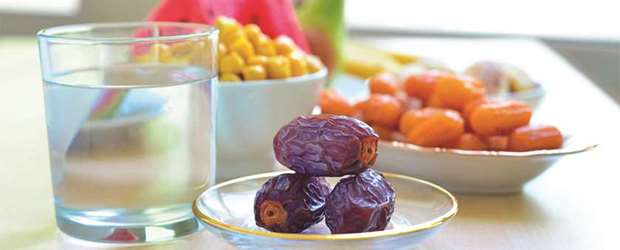Fasting Healthy
The information aims to help you understand the health issues related to fasting, so that you are able to make more informed choices, to minimise complications and maximise the benefit of your fast.
The body enters into a fasting state eight hours or so after the last meal, when the gut finishes absorption of nutrients from the food. In the normal state, body glucose, which is stored in the liver and muscles, is the body’s main source of energy.
During a fast, this store of glucose is used up first to provide energy. Later in the fast, once the stores of glucose run out, fat becomes the next store source of energy for the body. Only with a prolonged fast of many days to weeks does the body eventually turn to protein for energy. This is the technical description of what is commonly known as ‘starvation’, and it is clearly unhealthy.
As the Ramadan fast only extends from dawn until dusk, there is ample opportunity to replenish energy stores at pre-dawn and dusk meals. This provides a progressive and gentle transition from glucose to fat as the main source of energy, thereby preventing the breakdown of muscle for protein.
Balanced food and fluid intake is important between fasts. The kidney is very efficient at maintaining the body’s water and salts, such as sodium and potassium. However, these can be lost through sweating. To prevent muscle breakdown, meals must contain adequate levels of ‘energy food’, such as carbohydrates and some fat. Hence, a balanced diet with adequate quantities of nutrients, salts and water is vital.
Don’t skip Suhoor
Even though the thought of sleep may be far more appealing than waking up to force down some food, do not skip Suhoor. Suhoor is the most important meal of the day and during Ramadan – it is the meal that will sustain you for the next few hours.
Good and bad foods during Ramadan
During Ramadan you need to put extra efforts in including foods from all five food groups to ensure variety and a well-balanced diet. These foods include:
• Breads, cereals and other grain products
• Fruit and vegetables
• Eggs, meat, fish and poultry
• Milk, cheese and yoghurt
• Fats and sugars (these contain very little nutrients and are high in calories and therefore their intake should be limited).
Complex carbohydrates are foods that will help release energy slowly during the long hours of fasting and are found in grains and seeds like barley, wheat, oats, millets, semolina, beans, lentils, whole meal flour and basmati rice.
Fibre-rich foods are also digested slowly and include bran, cereals, whole wheat grains, vegetables such as green beans and seeds and almost all fruit, including apricots, prunes and figs.
Foods to avoid are the heavily processed and fast-burning foods that contain refined carbohydrates such as sugar and white flour or fatty food like cakes, biscuits, chocolates and sweets. It may also be worth avoiding the caffeine content in drinks such as tea, coffee and cola (caffeine is a diuretic and stimulates faster water loss through urination).
What if I’m unwell during Ramadan?
If fasting significantly affects the health of the fasting individual or when one is genuinely sick, Islam exempts them from fasting. “God intends every facility for you; he does not want to put you into difficulties” (Qur’an 2:185).
People on regular medicines should discuss this with their doctor. Fasting is not a must for pregnant women or children under the age of nine.
Exercise during Ramadan?
It is advisable to reduce the level of high impact exercise you perform during Ramadan because of the reduced energy.
Yoga plays less stress on your body and also allows you to relax and meditate during your exercise. If you need a heavy workout, consider exercising after you have broken the fast.
Can I smoke during Ramadan?
Smoking is considered to void a fast because you take something into your body through your mouth. A principle of Ramadan is purification of the body.
Ramadan quick tips
• Eat normal sized, nutritious meals rich in fruit, vegetable, beans, lentils rice and grains. at Suhoor and Iftar.
• Avoid foods high in fat, salt and sugar.
l Drink plenty of fluids and avoid caffeinated beverages like coffee, tea, energy drinks or cola.
• Speak to a health doctor if you are on regular medication or pregnant or breastfeeding if you decide to fast.
• Avoid excessive exercise during fasting times.
Foods to avoid
Deep-fried foods such as pakoras, samosas, and fried dumplings should be replaced with whole grains like, chickpeas (plain, or with potato in yogurt with different Indian spices), samosas baked instead of fried, and boiled dumplings.
High in sugar and fat foods like, Indian sweets such as ghulab jamun, rasgulla, balushahi, and baklawa can be replaced with milk-based sweets and puddings like rasmalai and barfee.
High-fat cooked foods like parathas, oily curries, greasy pastries can be changed with chapattis made without oil, and baked or grilled meat and chicken.
Diabetes and fasting during Ramadan
It is better for persons with diabetes to have a visit to their diabetes care-giver to take advice before fasting.
Persons with diabetes, who are controlled on diet, metformin or DDP4 Inhibitors (januvia , Galvus, onglyza) can undertake fasting like any other person as the risk of hypoglycemia is least with these drugs. Those, who are on sulfonylureas (daonil, glimipride, glyclazide) and insulin have the risk of hypoglycemia on fasting. They should at least in the initial days self-monitor blood sugar levels to see the trend with change in food intake. They need to break the fast in case of low blood sugar level. (Blood sugar testing will not break a fast.)
* Dr Simi Lali, General Practitioner- Emergency Medicine, Aster Hospital, Doha, Phone: 44440499



